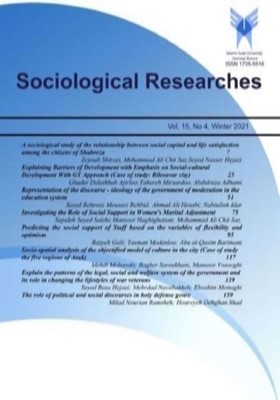-
-
List of Articles
-
Open Access Article
1 - A sociological study of the relationship between social capital and life satisfaction among the citizens of Shahreza
Zeynab Shirazi Mohammad Ali Chit Saz Seyed Nasser Hejazi -
Open Access Article
2 - Explaining barriers of Development with emphasis on social-cultural development with GT approach (Case of study: Bilesavar city)
Ghader Dolatkhah Ajirloo Tahereh Mirsardoo Abdolreza Adhami -
Open Access Article
3 - Representation of the discourse - ideology of the government of moderation in the education system
Seyed Behrooz Mousavi Behbid Ahmad Ali Hesabi Nabiullah Idar -
Open Access Article
4 - Investigating the Role of Social Support in Women's Marital Adjustment
Sepideh Seyed Salehi Mansour Haghighatian Mohammad Ali Chit Saz -
Open Access Article
5 - Predicting the social support of Staff based on the variables of flexibility and optimism
Razyeh Goli Yasman Modanloo Abu al-Qasim Barimani -
Open Access Article
6 - Socio-spatial analysis of the objectified model of culture in the city (Case of study the five regions of Arak)
Mehdi Mobaraki Bagher Saroukhani Mansoor Vosooghi -
Open Access Article
7 - Explain the patterns of the legal, social and welfare system of the government and its role in changing the lifestyles of war veterans
Seyed Reza Hejazi Mehrdad Navabakhsh Ebrahim Mottaghi -
Open Access Article
8 - The role of political and social discourses in holy defense genre
Milad Nourian Ramsheh Houreyeh Dehghan Shad
-
The rights to this website are owned by the Raimag Press Management System.
Copyright © 2021-2025







